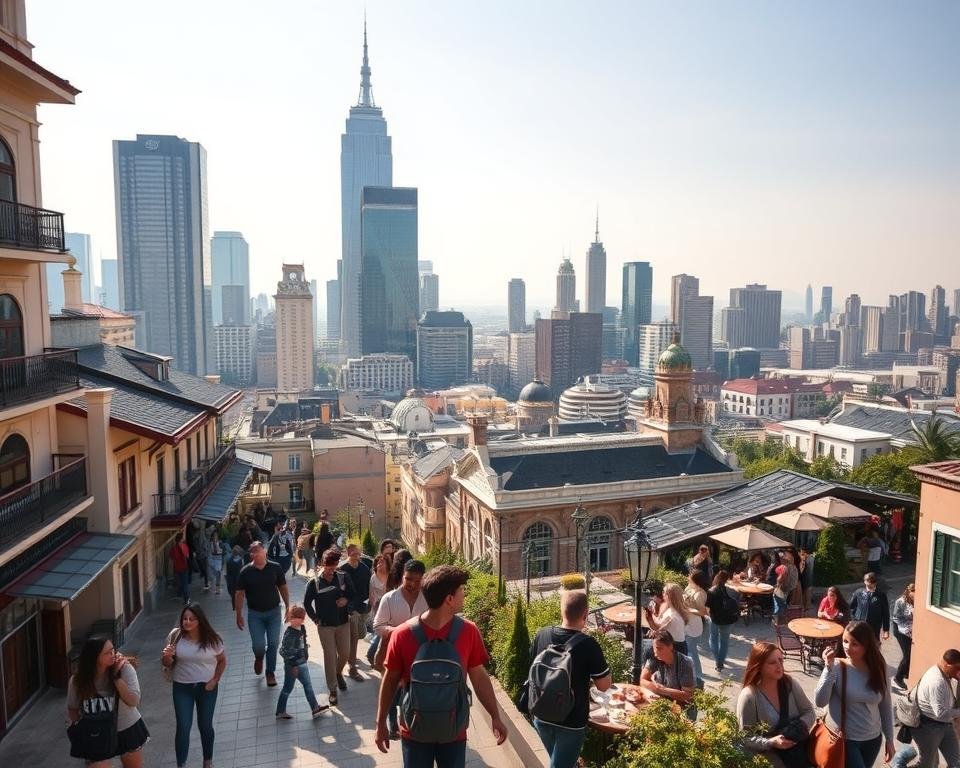
Guide to Living and Studying Abroad for International Students

Imagine walking into a classroom full of students from all over the world. Each one has their own story and dreams. Studying abroad is more than just getting a degree. It's about opening up to new possibilities.
In 2025, many students are choosing the United States for their education. They want the academic quality and the chance to grow personally. This experience is unique and life-changing.
But, studying abroad isn't easy. You'll face new places and language challenges. This guide will help you understand the benefits and how to adapt. It's for those interested in long-term studies or short exchanges.
It's all about exploring and growing. To learn more about student migration, check out this detailed guide.
Explore Key Topics on Living Abroad
Living abroad is an exciting adventure with new experiences. But, it also has challenges that need careful thought. Knowing the cost of living in your host country is key for budgeting. Tuition fees can range from $10,000 to $60,000 a year, depending on the university type.
Monthly costs, like housing & accommodation, food, and transport, are also important. These must be included in your financial plans.
Finding the right housing & accommodation is a big task. Many students live in shared apartments, dorms, or homestays. Each has its own benefits and costs. City guides can help find safe areas and local amenities, making sure your living space fits your lifestyle.



Embracing the local culture & lifestyle makes your study abroad experience richer. Getting involved in local traditions, foods, and norms helps you connect with the community. City guides provide valuable information to help you navigate your new home confidently.

For more detailed information on the cost of living and study tips, check out city guides made for students. These resources can make your transition smoother, preparing you for what's ahead.



Why Living Abroad Is a Life-Changing Experience
Living abroad is a big step for students looking to study internationally. It comes with many benefits, but there are also challenges. Students often struggle with language barriers, which can make socializing and studying hard.
But, learning to communicate well is key to growing personally. It helps students dive deeper into the local culture.
Main Challenges for Students Living Abroad
Adapting to a new place can be tough. It takes a lot of resilience and flexibility.
Language Barriers
Language differences are a big hurdle for students in foreign countries. Speaking the local tongue makes everyday life better. It helps students connect with others and the community.
Homesickness
Homesickness is common for students abroad. Being far from home can feel isolating. But, making new friends and trying new things can help.
It makes the experience richer and more rewarding.
Budgeting in a New Currency
Managing money in a new currency is essential. It's not easy, but it's necessary for living well. Understanding the local economy helps students manage their finances better.

Overcoming these challenges is key to a successful study abroad experience. For more on homesickness, check out this resource. Also, see this link for insights on student trends.
How to Adapt Quickly and Build a New Life Abroad
Adapting to a new culture takes effort and a positive attitude. Getting involved in local communities is a great way to start. It helps you make friends and find support.












Student support services are key for a smooth transition. Schools often have programs for international students. These include orientation and help with culture shock and mental health.
Knowing local customs and laws is important. It helps you make friends and feel at home. Finding a balance between school, work, and fun is also key. It keeps you happy and successful.
| Key Areas for Quick Adaptation | Details |
|---|---|
| Engagement with Community | Join local clubs or volunteer programs to create a support network. |
| Utilization of Student Support Services | Access programs for culture shock, healthcare guidance, and academic advice. |
| Understanding Local Norms | Learn local traditions and laws to foster respect and open communication. |
| Balancing Responsibilities | Manage time effectively among studies, work, and leisure for overall satisfaction. |

Studying Abroad for International Students
Studying abroad is a unique chance for international students to learn and grow. It changes the way they see the world and themselves. Students dive into new cultures and gain a global view, essential in today's world.
Benefits of Participating in Study Abroad Programs
Study abroad programs offer many benefits. Students improve their language skills by talking with locals. This is very useful in a global job market.
These experiences also make students see their studies in new ways. Employers like students who have studied abroad. They see them as adaptable and proactive.
Types of Study Abroad Opportunities
There are many ways for students to study abroad. Here are some popular ones:
- Exchange Programs: Students go to classes at a partner school abroad and host a student from there.
- Internships: Students get practical work experience in a real setting.
- Volunteer Opportunities: Students help with community projects, deepening their cultural experience.
| Type of Opportunity | Description | Benefits |
|---|---|---|
| Exchange Programs | Students swap places with peers from partner institutions. | Cultural immersion, enhanced language skills. |
| Internships | Work placements that offer professional experience. | Builds resumes and develops critical work skills. |
| Volunteer Opportunities | Involvement in community projects while studying. | Strengthens cultural understanding and social responsibility. |
Essential Tips for a Successful Study Experience
Getting the most out of your time abroad needs careful planning and active participation. Good time management is key to a successful study experience. Try making a weekly plan that includes classes, studying, and fun. This can help reduce stress and make your academic journey better.
Using campus resources is also important. Libraries, tutoring sessions, and study groups can help you understand your courses better. They also give you a chance to meet new people. This can lead to better grades and happiness.
Having a dedicated study area can help you stay focused. Find a quiet, comfy spot with everything you need. Make it your own to stay motivated. Also, getting involved in local events and clubs can broaden your experience. It helps you feel at home and can improve your language skills.
Connecting with international students can create a supportive community. Joining campus events can help you make friends and find help when you need it. These steps make your study abroad experience more rewarding. Embracing your new surroundings can also help you grow personally.
Learn more about making the most of your time abroad by checking out study abroad tips and the role of cultural adaptation in your journey.
Financial Planning for Your Journey Abroad
Financial planning is key for anyone going on a study abroad trip. For international students, knowing how to manage money is vital. It can make a big difference between a great experience and financial worries. Good budgeting tips help students plan their finances well, covering all the important costs.
Budgeting Tips for International Students
Creating a detailed budget is the first step to financial success. Here are some important tips:
- Think about all costs, like tuition, living, food, travel, and fun activities.
- Keep track of your spending to see where you can cut back.
- Save money for unexpected expenses to avoid financial trouble.
Using budgeting apps can make tracking your money easier. These tips help international students make smart financial choices while studying abroad.
Study Abroad Scholarships and Grants
Many groups offer scholarships for international students to study abroad. It's important to look for and apply for these scholarships. Key things to remember include:
- Apply early, as many scholarships have deadlines long before school starts.
- Check the eligibility criteria to make sure you qualify and stay eligible.
- Look at different scholarships from universities, governments, and private groups.
Getting study abroad scholarships can really help with money worries. By looking into these options, international students can start their studies with the financial support they need.
Cultural Immersion Experiences While Studying Abroad
Cultural immersion is key when studying abroad. It lets students dive into the local culture. By joining local events, they get to know their host country better.
Culinary classes are another great way to learn about culture. Cooking traditional dishes improves cooking skills and understanding of local customs. It also helps students connect with locals and share cultural experiences.
Volunteer programs offer a unique way to dive into the culture. Helping out in community projects builds friendships and helps the community. It also grows personal and cultural understanding.
It's important to step out of your comfort zone for these experiences. Exploring markets and talking to locals are great ways to learn. Students who really get to know the local way of life find their experiences more fulfilling.
For those looking for cultural immersion, programs like the Critical Language Scholarship are great. They offer fully funded study abroad opportunities for language learning. These programs enrich learning and help build global connections.
Choosing the Right Study Abroad Destination
Choosing the right place to study abroad is key to a great experience and learning. For 2025, many factors matter, like the school's reputation, cultural experiences, and support for international students. This part will look at top places to study abroad, helping you make a smart choice.
Popular Study Abroad Destinations for 2025
Some places are more popular for studying abroad in 2025. They offer unique experiences and lively settings. Here are the top spots:
- United Kingdom: Famous for top universities like Oxford and Cambridge.
- Australia: Known for its diverse culture and great schools like the University of Melbourne.
- Germany: Offers quality education without tuition fees at public universities for international students.
- Canada: Welcomes students with its friendly society and top universities like the University of Toronto.
- Japan: Combines old traditions with modern tech, making it a special place to learn.
Understanding Local Culture and Lifestyle



It's important to understand the local culture when studying abroad. Living like a local helps you connect with the community and grow personally. You'll learn about customs, traditions, and social rules that shape daily life.
By talking to locals, joining cultural events, and trying local foods, you can make your experience richer. These moments can also lead to lasting friendships.
Leveraging International Student Resources
International students have many resources to help them during their studies abroad. These include on-campus support like counseling and academic advising. There are also advocacy groups that empower students and guide them. Using these resources can greatly improve your experience and help you deal with the challenges of studying in a new place.
Many schools also offer technology platforms to connect students with peers and mentors. These networks let students share experiences, get advice, and make friends with others who understand studying abroad. Using these platforms can help you feel part of a community and show one of the benefits of studying abroad.
By using the wide range of international student resources, students can handle academic pressures better. They can also improve their cultural experience and gain valuable skills for the future. Embracing these opportunities makes the transition easier and enriches the study abroad experience. It ensures students feel supported and connected on their journey.
Frequently Asked Questions (FAQs)
- How do I find affordable housing as an international student?
Use university housing portals, student forums, and trusted local websites to compare rent options. - Is it safe to live alone abroad as a student?
Yes, but always choose verified accommodation and stay informed about your local area. - What is the average cost of living abroad in 2025?
It varies by country, but most students spend between $800–$1,500 USD monthly depending on location and lifestyle. - How do I adapt to a new culture while studying abroad?
Join local groups, learn basic language phrases, and stay open-minded to cultural differences.
Ready to Live and Study Abroad?
Learn how to adapt and thrive in a new country. Explore our guides on: Cost of Living, Housing & Accommodation, City Guides, Culture & Lifestyle, and Study Tips.


